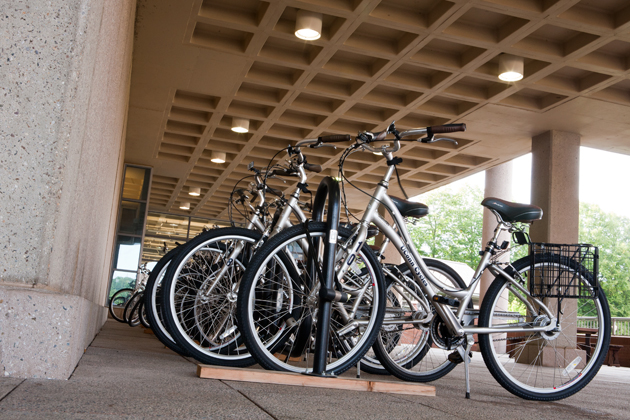
The University’s carbon footprint is about to lose a size or two.
A bike sharing program operating out of the Homer Babbidge Library has begun loaning bicycles to faculty, staff, and students. About 20 bikes are available.
Similarly, starting in late September or early October, Hertz on Demand will bring four vehicles to campus – an all-electric car and three Ultra Low Emissions Vehicles (ULEV) – that may be borrowed by anyone over the age of 18 with a clean driving record. Unlike the bikes, which are free, the cars will cost the borrower $8-$9 an hour. The rental fee includes gas, insurance, maintenance, and 24-hour roadside assistance. There is no cost to the University.
“Quite a few students on the Storrs campus are either unable to have a car on campus or just don’t own one,” says William Wendt, director of transportation, logistics, and parking services. “This will enable them to get around when they need to without having to ask friends or neighbors for a ride.”
Richard Miller, director of the Office of Environmental Policy, says the hope is that knowledge of the program will cause some students to leave the less fuel-efficient family car at home. “There is a rental charge, but with gas at nearly $4 a gallon and the wear and tear that comes from using the family car on short trips, we think it would be cost effective to just use these. The students would also avoid the parking fee on campus.” Miller adds that, if there is sufficient demand, Hertz will increase the number of cars available in Storrs.
“The rental program is great if, for instance, you and some friends or family want to visit New York City,” he says. “You can drive one of the rentals to New York, leave it in one of the Hertz parking spots and enjoy yourself. When you’re ready to leave, just contact Hertz and they’ll have another car there ready for you to drive back to campus.
Besides the all-electric car, Hertz will also provide a ULEV SUV. The all-electric car in the fleet will be charged at a new electric vehicle charging station located near the University Motor Pool, off North Hillside Road.
The charging station, donated to the University by Connecticut Light & Power (CL&P) in return for research on the station’s use, will also provide the power for an all-electric eStar step van the University is purchasing, using a $75,000 grant from the state Department of Transportation. The eStar is cleaner and less expensive to operate than the 10-year-old diesel truck it will replace.
The charging station is expected to be installed within the next couple of weeks.
UConn is also exploring the possibility of acquiring several other charging stations; and a CL&P program to place stations in towns across the state also has Mansfield listed as a potential site, including one in the Intermodal Transportation Center being built on the site of Storrs Downtown.
“The cost of electric vehicles should decrease dramatically in the years ahead as production costs fall — especially the cost of the battery. At the same time, the cars will have a longer range, faster recharging capabilities, and there will be more choices, better performances, and other improvements,” says Miller.
Both the electric cars and bike program also advance the University’s Climate Action Plan, and provide more options for students, faculty, and staff.
The bicycle loaner program, a concept also attempted by UConn (the famous “blue bikes”) and other universities in the 1960s, gives faculty, staff, and students the opportunity to use a bicycle for an hour or a day free of charge. Unlike the earlier program, though, borrowers will have to swipe their UConn ID at the library’s iDesk to take a bike, and they must return it to the library after every use or by 5 p.m. if they keep the bike for the day. The original program did not have that requirement, and the program ended when a number of students thought returning the bikes to the bottom of Mirror Lake worked just as well. A similar program at Cornell found students returning the bikes to some of the deep ravines on that campus.
Wendt says the original program “was a gallant effort, but it just didn’t work out. But times have changed, and we’ll have more protections in place now. We think it will work.”
Once patrons have swiped their ID card, they will be given a key to the bicycle lock, offered a helmet (recommended), and asked to sign a waiver stating they have read the safety instructions and that they accept responsibility for damage or loss of the bicycle.
UConn officials have also been offered the use of an all-electric Toyota Prius for a six-week period, an offer they are considering. First, however, Wendt says the charging station must be installed and a decision made regarding who will use the vehicle.



